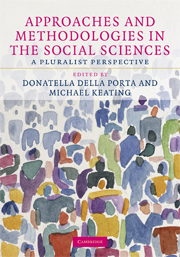Preface
Published online by Cambridge University Press: 05 June 2012
Summary
The genesis of this book lies in the early 2000s, at the European University Institute (EUI), where a number of PhD researchers started to complain about the neglect of ‘qualitative methods’. As only a minority of the faculty worked principally with quantitative methods, we had assumed that the rest were qualitative in the way that Molière's M. Jourdain was a speaker of prose. A series of discussions and debates revealed that in most cases they were talking about something else, a specific form of epistemology rather than a method, and one whose meaning was being continually stretched across the discipline. While it was difficult to tie down exactly what was meant by ‘qualitative’, it seemed to be defined in opposition to ‘positivist’, another description that most professors found difficult to accept for themselves and which was also subject to considerable stretching.
The EUI was not alone here, for this was merely the latest expression of a Manicheanism in which social scientists seem to be driven to define themselves into opposing camps. The fact that we could never find a shared name or vocabulary for the two approaches suggested that the question was altogether more complicated. It was also apparent that most of the issues at stake were not new but echoed debates in philosophy, sociology and political science going back to classical times.
- Type
- Chapter
- Information
- Approaches and Methodologies in the Social SciencesA Pluralist Perspective, pp. xiii - xviPublisher: Cambridge University PressPrint publication year: 2008
- 2
- Cited by

